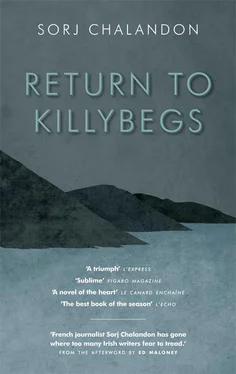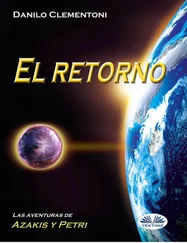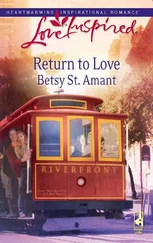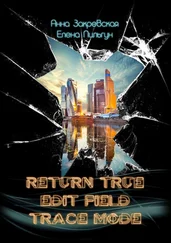— What strong signal?
— A gesture for the prisoners.
— A gesture?
— Or a word, a phrase that would allow everyone an honourable way out.
— Too early.
— Well then, an Armalite in one hand…
He wrote, then crossed out that sentence. Like me, he knew that no military victory would ever be won in Northern Ireland. The IRA wasn’t strong enough to break up the British force. And after having fought our great-grandparents, our parents and us, the British were going to have to fight our children, and our children’s children. He nodded, looking at me. There was something in his eyes. Curiosity, interest, even sympathy, I searched for a long time without working it out. One day, he asked me why we were at war.
— God made us Catholics, the gun made us equals, I answered.
He circled the sentence to check it, just to make me smile.

In 1991, we swapped the Jussieu Campus for the red double-decker buses imported from England for tourists to take trips around Paris. In winter as well as summer we’d go up on top, in the open air, carefully choosing the passengers sitting close by. We’d pick Asians or Arabs. We’d listen to them, and if they were speaking English between themselves, we’d change seats. Honoré would always sit on the outside and I’d sit in the aisle seat so as not to be seen from the street. The tour had commentary included, with tourist information and music. Each passenger had headsets, so we could speak freely in low voices. Honoré would always get off at the Louvre and I’d stop at Opéra. No goodbyes. Until the next time.
When I’d get back to the hideout, I’d sometimes pass by Antoine’s workshop. I’d look at him from the street, through his ground-floor window, bent over a volute, knife in hand. Local residents would often stop to watch his work. He didn’t see them, but he would sense my presence. He’d raise his head. Just a sign, a wink, the code of a resistance fighter, before returning to his work. I could tell his heart was pounding. On the other side of his window stood the great Tyrone Meehan, secretly furthering his country’s struggle. What had he done? Transported arms? Checked places out? All that mattered was that he was safe in this city, this street, this hideout, and that he owed it to a French violin-maker.

Paris gave me the courage to brave Belfast. With Honoré, I had some influence. With Waldner, I skulked along the walls. My work with one justified my informing the other. After all, why not instruct the enemy about our politics? What had we to hide? Nothing. Sinn Féin spent its time calling for dialogue with the British, and there, in Paris, Honoré and I had initiated peace talks. For eleven years, he had been Margaret Thatcher, then John Major, then Tony Blair for me, and I had been the IRA for him.
But above all else, I was Tyrone Meehan, a Republican combatant. I wasn’t renouncing or corrupting anything. I had left the bastard on the curb of the Falls Road. In Paris, I wasn’t betraying, I was teaching. I was doing something useful, active, essential and probably historic. Something that hadn’t yet been attempted by anybody in the movement. Without my leaders’ approval, or even their authorization, I was in direct contact with the enemy through its ambassador, and we were preparing the future. It was dizzying, beyond intoxicating. I felt stronger than anyone or anything. Greater than our politicians, than the IRA Council, than Waldner, than the red-haired handler. So much more important than Honoré, this kid from Norfolk who wrote down what I dictated. I had never felt that power. In my whole life, I had never been so strong. I wasn’t obeying anyone’s orders. I was writing my country’s history. In secret, in silence, on the fringes of my world and people, I was serving my homeland to the best of my ability. I was so much more useful to peace doing this than I was firing some futile shot at a night patrol from a rooftop.
There was respect in the way Honoré looked at me. That distinctive brightness, that complete attention, beauty I couldn’t name, that’s what it was. Honoré respected me. He drank up every sentence I uttered. He still circled information to check, but less and less frequently. The word ‘fascinated’ hit me one intoxicating day. That was it exactly: I fascinated the enemy and he respected me. He no longer commanded me, it was I who had him.

One afternoon in June 1994, while our bus was parked at Trocadéro, Honoré’s respect for me was transformed to admiration. I had just told him that the IRA had decided to permanently cease hostilities. He looked at me without writing. For a long time, without saying a word. And then he turned his head. The Eiffel Tower, the laughing tourists, the souvenir vendors, the cloudless sky. When he turned back to me, I thought I saw a child.
— Are you sure, Tyrone?
Tyrone. Not Meehan, not Tenor. The name my father had given me. Yes, I was sure. I knew. Before the year was out. That summer, perhaps.
— A ceasefire, Honoré murmured to himself.
— No. The complete cessation of military operations.
He looked at me again, the way you’d fondly look at a friend. And then his eyes left mine for the first time. He was writing. His hand was shaking. It was as if he didn’t want to let that phrase slip away.
The complete cessation of military operations.
He reread the sentence. Contemplated it all the way to the Champ de Mars.
And he didn’t circle it.

The British would negotiate with the IRA. The Protestants would be obliged to accept us in the corridors of power, and then at the decision-making table. And one day Ireland would be united again. Then the border would be trampled over by thousands of laughing children. Then our women, our men, our daughters and our soldiers would run across the fields towards our brothers in the Republic. Then they would finally embrace, hug, kiss and cry with joy. Then the breeze would get up and the sun shine on our flags. Then we would suddenly be on our knees, and suddenly, from cities to villages, from Belfast backstreets to Dublin avenues, from Wicklow hills to the harbour in Killybegs, we’d be praying for our martyrs and thanking heaven. And our Protestant brothers would accept our outstretched hands. And war would be a thing of the past, and we would have peace for all time. And there I would be, in some dark corner, not even in uniform, without a medal, without friends, without cheers. I would be standing in the middle of my people, unknown, anonymous. I, who would have done that, all of it. Who could finally ask forgiveness of Danny Finley, of Jim O’Leary, and forgiveness of my dreams.
I dreamed of this day. For fifty-eight years I never stopped believing it would come. Hanged on 2 September 1942 at the age of nineteen and buried like a dog in a common grave within Crumlin Gaol, Tom Williams’s body was finally returned to us on 19 January 2000.
His family and last remaining brothers in arms were present when he was disinterred. Some companions had asked me to be there but I was unable to face it. I had been drinking the night before, all night. In the morning I was still drunk. Sheila dressed me for the ceremony.
— It seems strange to honour a guy who used to kill our boys while we were off fighting the Nazis, Waldner had said.
— Ireland is more important than everything else, is that it? Honoré asked me.
Читать дальше













